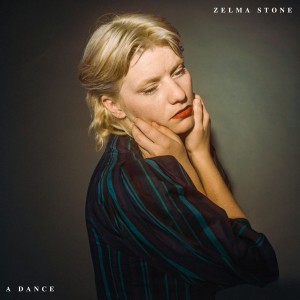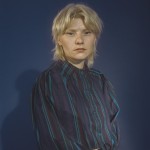
Artist
IMAGES: To download, click above. Credit to Westley Werner.
ZELMA STONE
Anyone who’s experienced grief knows that healing isn’t linear. There are days when it consumes and envelops, and others when a pinprick of light forces its way through the cloud cover, peeling the sky open to a fresh horizon. Grief’s ebbs and flows are unpredictable and we’re powerless to control them, much less the circumstances that set us afloat on their waters.
But there’s also a preciousness to pain that’s challenging to talk about—the way surviving it can open us to the truth of life’s fragility, the depth of its beauty, and the seeming inevitability of its great design. It’s the open-armed attunement to this tidal flux that inspired the songs on Zelma Stone’s fourth EP A Dance, a series of songs mirroring both the individual stages of grief as well as the ways in which they spiral into one another, helical, like dancers moving through air.
Songwriter Chloe Zelma Studebaker (she/they) is uniquely practiced in this particular dance. “I’ve performed too many times at funerals,” she says wryly, a testament to the fixture that loss has become in her life. At only 27 years old, she’s already grieved too many friends and family members, including her older brother who’s love of music inspired hers. Her songs have become where she goes to process the grit of life—all those experiences that have the capacity to transform us—and she does so with bracing power and vulnerability.
With A Dance—which was co-produced with Meernaa’s Carly Bond at Altamira Sounds Studio in Alhambra, CA—Zelma holds tender her most painful emotions while readily willing herself to let them go. “I’m here and ready for love,” she repeats over the course of “Be The One,” her voice pressed unwavering against the listener’s ear as the song builds around the warble of a pedal steel unfurling. Throughout the EP’s four songs, Zelma’s voice is the porous scaffolding around which warm beds of luminescent synths, exultant guitars and woody drums weave. Songs build and swirl with meticulously-crafted precision, her words looping in on themselves like incantations. “Are you okay? / Are you alright? / I thought you had it all worked out last time,” she repeats throughout title-track “A Dance,” like an intrusive thought changing shape and growing violent as her falsetto gives way to a belt by song’s end, her voice a burning ember.
These aren’t mournful songs, as much as they are the result of someone who’s allowed themselves the full landscape of their mourning. “Are they really there?” Zelma wonders repeatedly of her deceased beloveds on “Really There,” her voice measured and bright over the thud of pensive dark drums. With each repetition, the question shapeshifts—one minute filled with doubt and the next, a sense of comforting wonder. There is a deep well of acceptance in these songs, as Zelma’s explorations of spirituality duet with her recognition of her own agency. On EP-closer “Be Free” pedal steel and propulsive bass build to revelation. “I can see what I need to be / I can be free / Want to be / I can see I need to be me to be / Free,” she sings assertively.
“I have the power to decide where I want my life to go and how I want to feel,” Zelma reflects. And though healing has required giving space to pain, so too does it require an openness to the freedom that exists in releasing it. Like the dancer that she is, Zelma carves her path with each gesture, asserting in her movements that she’s ready, open, here.


